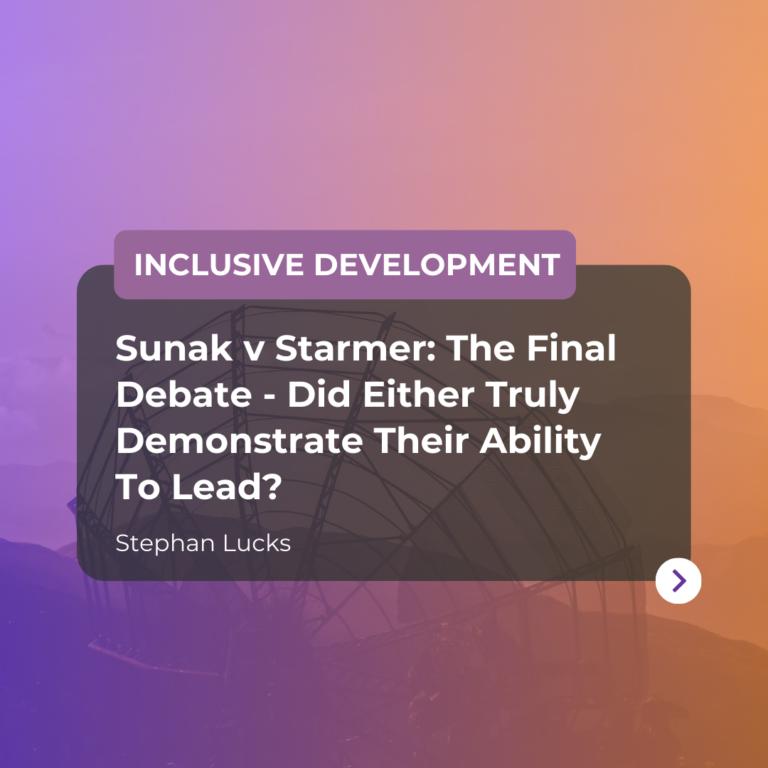The UK General Election 2024: Where are we now?
We’ve now reached the official end of the televised leadership debates between Rishi Sunak and Sir Keir Starmer, but are we any closer to having seen clear signs of leadership? Sadly, the answer is no. In the run-up to the debate, we continued to hear about gaffs by both parties, principally centred on the betting scandal and how the leaders talked about each other before the debate was carried well into it.
Whilst policies and plans aligning with voters’ values are clearly crucial in making a decision, what also resonates with the voting public are the leadership qualities that are demonstrated (or not). The leadership ability demonstrated in these televised debates ought to give us confidence in them as individuals, an idea of their plans and vision for the future, and their ability to deliver what they set out to.
Measuring the leadership competencies of Sunak and Starmer in the election debates
As a reminder, we set out to compare the leadership styles of the leaders of the major parties by using the head-to-head political debates as the main forum for comparison. We used a simple rating scale of:
- Capability to deliver results (expresses plans and views with clarity and conviction, is decisive, emphasises commitment to deliver policies, is clear and consistent throughout the debate)
- Positive personal impact (tone and body language align to words, communicates in a trustworthy way, is authentic, genuine and caring, and listens carefully, considers other perspectives, and responds considerately to questions)
- Shares a clear and compelling vision of the future (communicates a vision of a more positive way of life, reminds us of what is really important, is inclusive, compelling, specific and believable about what can be achieved in the future, has a vision that will appeal to a diverse audience)
In our analysis so far, we concluded that each leader’s focus was on repeating very specific political points and trying to devalue the opposition by talking across each other rather than giving thought to how they could connect with the audience, demonstrate empathy, or set out a compelling and positive vision. We saw this in the first debate, at the halfway mark and, sadly, this is what we have continued to see.
Sunak v Starmer: The Final Round
The final political head-to-head took us to the University of Nottingham. The city voted for the Conservatives in the general and local council elections of 2019, but the audience consisted of a mix of Conservative and Labour supporters as well as undecided voters. The final debate took the form of a Q&A session with questions from the audience to the two leaders, each taking it in turn to reply, and then an opportunity for a 30-second summary right at the end of the debate.
Assessment of Leadership In The Final Debate: Keir Starmer
- Capability to deliver results: 1 Weak
- Positive personal impact: 2 Moderate
- Shares a clear and compelling vision of the future: 1 Weak
Under constant attacks from Rishi Sunak, Sir Keir carried himself reasonably well. He managed to remain calm under pressure and not rise to the constant interruptions and attacks that levelled at him, at one point showing empathy for the audience who wanted to hear answers rather than continuous interruptions.
He also connected with the audience more than on previous occasions, evidenced by his ability to remember audience names, use them, and seek common ground with some of the questioners in his responses.
However, there were instances when he was less confident and comfortable, particularly when challenged on issues he had not had a clear view on in the past and seemed to fluctuate between different views.
He frequently made reference to his past achievements as head of the CPS and his work with the police in bringing criminals to justice and used this to seek to illustrate, for example, how he would deal with the migrant smuggling gangs. However, Starmer communicated no clear plan about anything he talked about, so his ability to deliver a better NHS, better schools, better public services and his mantra to ‘grow the economy’ were not backed up by clear action plans.
The point above also links to his ability to communicate a vision—which was lacking. At no point did Starmer share a coherent message about the future that he wished for the country, one that was compelling or gave people hope that things would be better under a Labour government. While saying he would look to the future, the actual content of the debate focused on what was currently wrong and who was at fault.
Assessment of Leadership In The Final Debate: Rishi Sunak
Competency scores:
- Capability to deliver results: 2 Moderate
- Positive personal impact: 1 Weak
- Shares a clear and compelling vision of the future: 1 Weak
Rishi Sunak came across as clear and confident in his messages and remained consistent in those throughout. He was, however, frequently over-assertive and hectoring in his approach. Repeated interruptions, talking over, laughing at and ridiculing Sir Keir showed no effort to treat his opponent with respect or dignity. If he does this in public, it will leave the voter wondering about his behaviour behind closed doors. Although he spoke to conservative values such as “hard work should be rewarded”, his interpersonal style, certainly during the debate, didn’t say much about his values in relation to interacting with another human being.
Sunak consistently drew the audience’s attention to only the last 18 months of his leadership and spoke passionately about his beliefs – what he would do and has done. From an ability to deliver perspective, this came across as moderately strong. However, he took no responsibility for anything that happened before his watch and, as such, did not represent the conservative track record in any way. ‘Dodging’ the issues in this way showed a lack of sincerity and not being in touch with the experiences of the voting public.
His main messages related to dealing with immigration rather than being soft on it (citing the Rwanda plan as the action that will work) and lowering taxes through better management of the benefits system. He didn’t introduce further plans as to how he would seek to address the issues that the country is facing, which is thus likely to leave voters wondering about what would be different with another conservative term in office.
When it came to sharing a clear and compelling vision of the future, I think it’s fair to say that Sunak reintroduced project fear. His approach was to identify what would go wrong under a Labour administration rather than being able to give the voter a compelling vision of the future. Again, it didn’t provide much hope.
General Election Final Debate: The Verdict
The debates are over, and the public will head to the ballot boxes on July 4th to decide the country’s future. Like the previous debates, this one allowed us to see how the two leaders interact with some of the people who will decide their fate next Thursday.
Across these debates, have they demonstrated effective leadership, have they progressed, and have we seen any growth in leadership behaviours? Based on our competency rating, we haven’t seen any strong examples of leadership from either Rishi Sunak or Sir Keir Starmer during these debates, with the relative ‘strongest’ rating either has scored being only 2 – Moderate.
We’ve also not seen any progression across the three debates we observed and rated. When we take into account the interpersonal interactions, the lack of a compelling vision and the attempts at political point scoring, neither has really demonstrated the types of leadership skills in these debates that one would hope to expect of the next leader of the United Kingdom.
Join Us For A Special Election Webinar
As we’ve already mentioned, the ratings in these articles are based solely on the behaviours we have observed by each leader in the televised national debates. But what about when we look beyond the election trail debates and political point scoring?
Our co-founder and Senior Partner Professor Binna Kandola OBE will be hosting a special edition webinar on Tuesday 2nd July, where he will unveil the in-depth leadership profiles he has created, analysing the leadership capabilities of both Rishi Sunak and Keir Starmer.
Find out more and secure your free spot here: Election 2024 – Sunak Vs Starmer – The Role of The Leader In Election Success.







